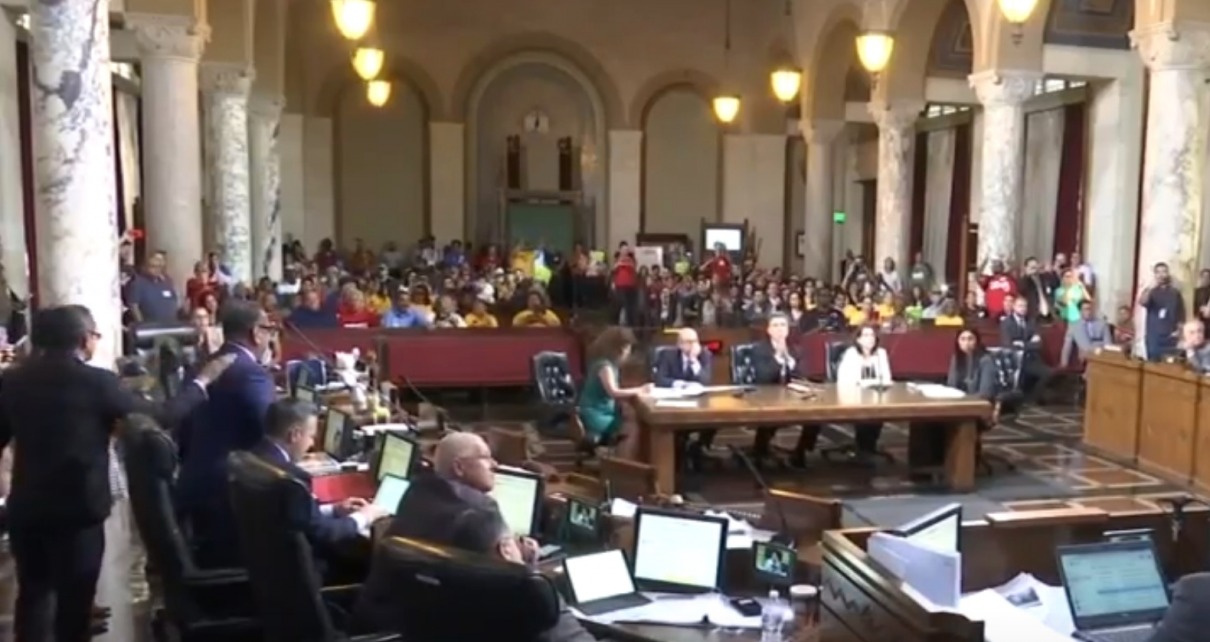
The Los Angeles City Council passes the temporary no-fault eviction ban on October 22, 2019. (City of Los Angeles)
No-Fault Evictions Become Illegal In Los Angeles
The Los Angeles City Council passes a temporary moratorium on evictions with no cause
By Evan Symon, October 23, 2019 1:46 pm
The Los Angeles City Council voted for a temporary emergency halt of no-fault evictions citywide on Tuesday.
The City Council heard hours of testimony from renters whose rents have shot up dramatically for no given reason, and are now being evicted, as well as tenants who have been given eviction notices for no stated reason. Many tenants, as well as some of the city councilors, stated that the reason that no-fault evictions had spiked in LA during the past month was because of the passage of AB 1482.
AB 1482, which comes into effect January 1st of next year, will enact rent control on rental properties across the state. Citizens and councilors claimed that landlords are raising rents dramatically and evicting lower-rent renters now so that they won’t be protected under the new law.
“We want to make sure that we can protect and give those protections to as many renters as we possibly can given the gravity of the situation,” said Councilman Mitch O’Farrell.

“What’s happening out there is shameful,” added Councilman Bob Blumenfield.
The council voted unanimously to pass the measure to the applause of the tenants packed in the City Council chambers.
While proponents, such as tenant groups and housing advocates, have praised the temporary stoppage as a bridge to when statewide rent control starts, opponents see this as another hurdle to remove bad tenants.
The California Globe contacted Al Wong, a landlord in Los Angeles who was at the council meeting, on the new eviction law.
“I get where they’re coming from, but all this does is make it that much harder for us to get rid of rowdy tenants,” Wong said. “There’s a lot of borderline cases where tenants facing eviction are only evicted because the court can see how detrimental they are to neighbors or how they effect others. These are often no-fault evictions. They’re for the sake of other tenants.”
“Now, unless they violate our lease or don’t pay, there’s nothing we can do, even if they’re bringing down the quality of life.”
“But this is only temporary. I guarantee you, the day after it expires, there’s going to be a lot of open rooms in LA.”
Under the temporary measure, all evictions in the city will now need to have cause, such as not paying rent or breaking the terms of a lease. However, landlords can still increase rent without limits until the rent control law goes into effect in January. Councilwoman Nury Martinez said that another temporary moratorium on rent increases and eviction because of failure to pay rent will be before the council in the next few weeks.
Chief assistant city attorney David Michaelson said the moratorium, after being signed by Mayor Eric Garcetti, will go into effect this week. Officials from other cities across California were present during the vote. With similar spikes in no-fault evictions happening across the state in the lead-up to statewide rent control, other cities are currently exploring measures similar to Los Angeles’ to temporarily stop no-fault evictions.
- Oracle Moving Headquarters Out Of Austin Only 4 Years After Moving Out Of California - April 26, 2024
- Congressman Adam Schiff Robbed of his Luggage in San Francisco Car Break In - April 26, 2024
- U.S. Senate Candidate Steve Garvey Denounces Protestors On Campuses Across California, Nation - April 25, 2024





What’s better than rent control? A tax on vacant lots and unoccupied buildings. While rent control makes it less attractive to supply accommodation, a vacant-property tax makes it less attractive NOT to! A vacant-property tax of $X/week makes it $X/week more expensive to fail to get a tenant, and thereby REDUCES, by $X/week, the minimum rent that will persuade the owner to accept a tenant.
Such a tax, although sometimes called a “vacancy tax”, is not limited to what real-estate agents call “vacancies” — that is, properties available for rent. It also applies to vacant lots and other properties that are not on the rental market, and is designed to push them onto the market and get them tenanted.
A vacant-property tax is intended to be avoided; if it’s properly designed, nobody actually has to pay it. And the *avoidance* of it would initiate economic activity, which would expand the bases of other taxes, allowing their rates to be reduced, so that the rest of us would pay LESS tax!